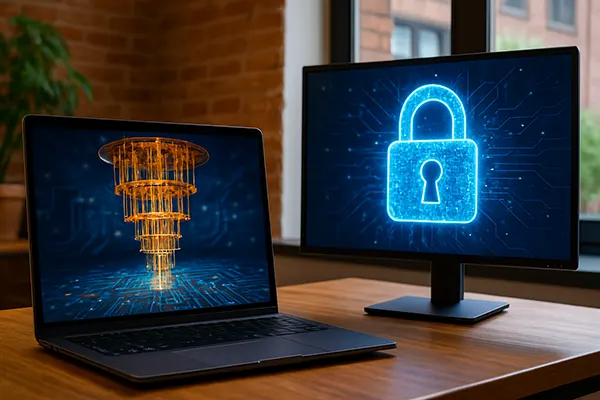
Role of Quantum Computing in Developing Cybersecurity Systems for Small Businesses
In recent years, the rapid evolution of quantum computing has opened unprecedented opportunities across many industries. One of the most significant areas where quantum technologies are expected to drive transformation is cybersecurity. While tech giants like Google and IBM lead large-scale projects, a wave of smaller startups is focusing on practical quantum-safe solutions for small and medium-sized enterprises (SMEs), ensuring they too can face tomorrow’s threats with confidence.
How Quantum Computing Is Reshaping Encryption Methods
Traditional encryption methods, such as RSA and ECC, have been considered secure for decades, relying heavily on the difficulty of factoring large numbers or solving discrete logarithm problems. However, quantum algorithms like Shor’s algorithm pose an existential threat to these standards, as they can solve these problems exponentially faster than classical computers. As a result, the cybersecurity community is shifting towards quantum-resistant algorithms to future-proof sensitive data.
Startups are at the forefront of this transition, developing encryption protocols based on lattice problems, multivariate polynomials, and hash-based methods, all of which are believed to be resistant to quantum attacks. Notably, some companies have been collaborating with governmental institutions to speed up the adoption of post-quantum cryptography, ensuring that even small businesses are prepared for the quantum era.
In 2025, initiatives such as the National Institute of Standards and Technology (NIST) post-quantum standardisation project have gained substantial traction. Companies like PQShield and Post-Quantum Solutions are among the leaders offering practical toolkits for businesses looking to migrate to quantum-secure frameworks without the overhead of hiring in-house quantum specialists.
Startups Leading Quantum-Safe Solutions for SMEs
Among the many emerging players, Canadian startup ISARA has developed easy-to-integrate cryptographic solutions tailored specifically for SMEs. Their software enables organisations to adopt hybrid encryption models, combining classical and quantum-resistant algorithms for a gradual and cost-effective migration strategy.
Meanwhile, US-based evolutionQ offers quantum risk assessment services that are particularly attractive to small businesses lacking extensive cybersecurity teams. Their comprehensive packages include system audits, quantum risk reports, and migration roadmaps designed to be scalable and affordable.
Additionally, QuSecure, a Silicon Valley startup, is focusing on delivering “quantum as a service” (QaaS) models. This concept allows SMEs to access quantum-resistant security layers via subscription models, reducing the upfront investment needed to deploy cutting-edge cybersecurity systems.
Practical Challenges and Barriers for Small Businesses
Despite growing awareness, implementing quantum-safe solutions remains challenging for small businesses. Limited budgets, lack of technical expertise, and uncertainty about the timeline of quantum threats create significant hesitations. Many SMEs are caught between the need for preparation and the fear of investing too early in technologies that may evolve rapidly within the next few years.
Moreover, interoperability with existing IT infrastructures poses technical hurdles. Many legacy systems are not built to support hybrid cryptographic solutions, necessitating either complete overhauls or expensive adaptations. Some companies are addressing this by offering cloud-based APIs that allow gradual upgrades without interrupting core operations.
Educational efforts also lag behind. Many SME decision-makers are unaware of the implications of quantum threats or confuse quantum computing with artificial intelligence. Startups working in the sector have started to offer free webinars, resources, and personalised consultations to bridge this knowledge gap and promote early adoption strategies.
How Quantum-Safe Startups Support Education and Adoption
ISARA, for instance, has launched a 2025 webinar series focused on practical steps SMEs can take to evaluate their cybersecurity readiness. These webinars feature experts who explain complex topics in simple language, helping business owners understand the urgency without unnecessary technical jargon.
QuSecure has partnered with local business chambers across the United States to host seminars and distribute guides specifically aimed at non-technical audiences. Their approach highlights real-world case studies where early adoption of quantum-safe methods has prevented costly vulnerabilities.
Meanwhile, evolutionQ runs an annual SME-focused “Quantum Risk Readiness Challenge,” inviting small companies to assess their preparedness and win free consultations. By gamifying the process, they help demystify quantum cybersecurity and make it more approachable for businesses with limited resources.

The Future Outlook: Democratizing Quantum Cybersecurity
Looking ahead, experts predict that the next five years will see a democratisation of quantum-safe technologies. As quantum processors become more accessible, so too will the solutions designed to protect against them. Government-backed funding initiatives across Europe, North America, and Asia are accelerating research into affordable, open-source quantum security frameworks.
For small businesses, this means that access to high-grade cybersecurity measures will no longer be the exclusive domain of multinational corporations. Cloud providers are already integrating quantum-safe options into their services, offering plug-and-play solutions that require minimal technical expertise to implement.
In 2025, businesses that take a proactive approach to quantum cybersecurity are positioning themselves to thrive in a digital environment where resilience will be a competitive advantage. Small businesses willing to adapt early may find themselves not just protected, but ahead of the curve in a rapidly shifting technological landscape.
Final Thoughts: Preparing for a Quantum Future
While the advent of quantum computing presents undeniable risks, it also opens new opportunities for innovation and resilience. Startups developing quantum-safe solutions are not merely offering products; they are fostering a culture of cybersecurity that is inclusive and future-ready for organisations of all sizes.
SMEs that start their quantum transition today, supported by specialised startups, stand a much better chance of securing their assets, maintaining customer trust, and complying with emerging regulatory standards. By focusing on education, collaboration, and gradual implementation, the small business community can confidently navigate the quantum revolution.
In the end, quantum computing will not just challenge existing cybersecurity models—it will redefine them. Forward-thinking small businesses that embrace this change now will set new standards for security in the quantum age.




